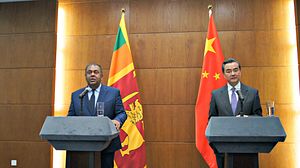Sri Lankan Foreign Minister Mangala Samaraweera was in Beijing the last two days of February, where he met with his Chinese counterpart, Wang Yi, as well as Premier Li Keqiang. China’s Foreign Ministry had previously talked up the visit as a way of establishing the foundation for China-Sri Lanka relations under new President Maithripala Sirisena. Samaraweera was the first cabinet member from the new government to visit China.
China used Samaraweera’s visit as a chance to refute the notion that extensive Chinese loans made to Colombo for various construction projects have a nefarious intent. “China’s loans were provided at the request of the Sri Lankan side… The loan arrangements, which are made upon consensus and oriented towards the entire nation and its people, have played a positive role in Sri Lanka’s economic and social development,” Foreign Ministry spokesperson Hua Chunying said on Monday.
Chinese officials also tried to rebut widespread interpretations that Sirisena will not be as friendly toward China as his predecessor. Wang stressed the “profound traditional friendship” China has for Sri Lanka. According to Sri Lanka’s Foreign Ministry, Samaraweera also emphasized the “solid and deep friendship between the two countries.” He added that Sirisena is “keen to take forward the [China-Sri Lanka] relationship to a new level of excellence.” Sirisena himself is expected to visit China at the end of March.
Wang also affirmed that the “China-Sri Lanka relationship is never targeted at or influenced by any third party” (a veiled reference to perceptions that India wants Sri Lanka to tone down its relationship with China). In a separate statement, Wang said that China “holds an open attitude” toward trilateral cooperation between China, Sri Lanka, and India. Wang said China is ready to “actively discuss” such proposals, including developing tourist routes that focus on Buddhism and having China and India work together to help boost “Sri Lanka’s economic and social development.”
In terms of outcomes, China and Sri Lanka took a step forward on making Colombo a major part of China’s Maritime Silk Road (MSR) initiative. Wang announced that China and Sri Lanka have agreed to establish a Joint Committee on Coastal Zone and Maritime Cooperation that will foster “cooperation in fields such as ports, marine resources management, ecological protection and maritime search and rescue.” Wang added that “China-Sri Lanka cooperation will become a model of maritime cooperation in the new era,” with Sri Lanka as a “a dazzling pearl” on the MSR (an interesting choice of words, given the persistence of the “string of pearls” theory). In terms of maritime cooperation, China’s Foreign Ministry refuted reports that Sri Lanka will no longer allow Chinese submarines to dock at Sri Lankan ports.

































